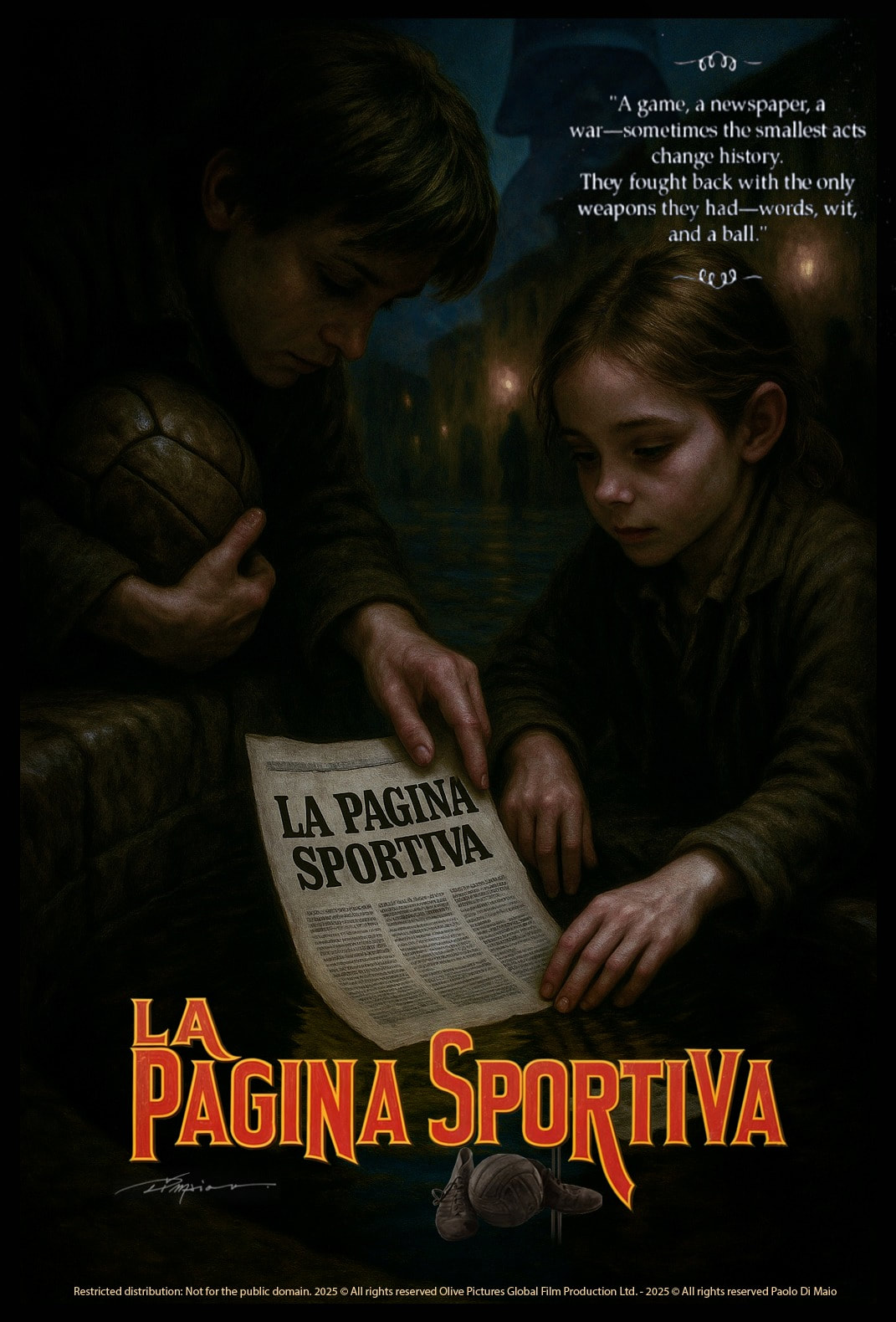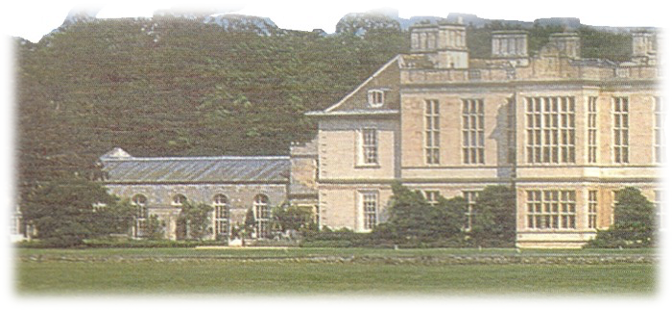|
La Pagina Sportiva - An Olive Pcitures Film
In the war-shadowed silence of Nazi-occupied Italy, amid the cobblestones of a forgotten mountain village, a revolution is whispered—not with guns, but with a ball, a page, and a fearless child's voice. La Pagina Sportiva is not merely a film. It is a cinematic heartbeat—a love letter to courage, memory, and the indomitable spirit of youth in the face of darkness. It is, above all, a tale of small heroes who never intended to be heroic at all. Inspired by true events, La Pagina Sportiva redefines the war genre through the eyes of its most unexpected protagonists: children. In a time where history was written in bullets and blood, this story is etched instead in dust, ink, and dreams. The children of Ortona dei Marsi—led by the fiercely clever Pietro and the unyielding, brilliant Mena—do not fight the enemy with rifles. Their weapons are far more disarming: football, friendship, and a newspaper ingeniously disguised as a sports column. Beneath every printed score hides coded intelligence. Beneath every kick of the ball, a silent act of rebellion. "A game, a newspaper, a war—sometimes the smallest acts change history. They fought back with the only weapons they had—words, wit, and a ball." This is the heart of the film: the idea that rebellion, at its most human, need not shout—it can whisper. It can be passed hand to hand like a folded page, or drift like dust between goalposts scratched in dirt. Here, La Pagina Sportiva declares its true genre: not war, but resistance. Not history, but prophecy. The plot both intimate and epic: a covert operation run not by seasoned spies, but by children, under the noses of their occupiers. When the Germans discover and destroy their underground press, the stakes rise to unbearable levels. But the children do not give up. Instead, they reimagine everything—creating a new tool of resistance: The Living Newspaper. It is both invention and metaphor, a cinematic device that turns the power of storytelling into an act of war. This narrative crescendo finds a chilling parallel in the arrival of a wounded partisan, bringing with him a story that transcends borders and draws the children into a global fight for justice. As alliances form and betrayals strike, the children face a devastating truth: they may lose everything. But in losing, they may light the fire that changes it all. The film’s emotional power is magnified by its setting: the towering Apennines, draped in snow and shadow, cradle the village of Ortona. The contrast between its breathtaking beauty and the suffocating weight of fascism is visceral. The Director’s Vision Statement, penned by Paolo Di Maio, reveals the film's true artistic DNA. Di Maio writes not of war but of memory. Not of battles but of symbols. He invokes neorealism--Bicycle Thieves, Cinema Paradiso, La Vita è Bella—but fuses it with the kinetic urgency of modern storytelling. In his own words: “We don’t just want to make a film. We want to make a statement. When the credits roll, we want the audience to leave with one thought lingering in their minds: ‘Would I have been brave enough to play?’” What elevates this project is its thematic depth and its timing. In a world once again wrestling with tyranny, censorship, and the devaluation of truth, La Pagina Sportiva holds up a mirror. It reminds us that resistance doesn’t always look like revolution. Sometimes, it looks like a child passing a ball in the dust, with a story hidden in his pocket. With its rich historical authenticity, emotional resonance, and innovative narrative devices, La Pagina Sportiva is positioned as a festival darling, a critical success, and an enduring cinematic classic. It is a film that dares to believe in the power of storytelling. Not to distract from pain—but to confront it. Not to rewrite history—but to whisper into its margins: we were here, and we dared to speak. |
|
THE CAPTAIN AND THE KING aka THE KING AND THE CAPTAIN A legendary true story of the British explorer, cartographer, photographer and soldier who befriended and fought alongside King Abdul Aziz, Ibn Saud to help create the Kingdom of Saudi Arabia. An unheard of legend. William Shakespear bore a name that was all too easily remembered, but he lived a life that has been all too quickly forgotten. A pioneering photographer and cartographer, dedicated linguist and botanist, profession diplomat and soldier, Shakespear gave his life to the birth of modern Arabia. Born a son of an empire in retreat, he died a brother of a people in the making. In 1907 Captain William Henry Irving Shakespear was appointed Political Agent in Kuwait at the age of twenty-five. He was the youngest Consular Official in the history of The British Empire and a protege of The Viceroy of India, Lord kitchener. The appointment of such an enigmatic, intelligent and independently minded Indian Army Officer to a sensitive post in the gulf ruffled feathers in The Foreign Office from the start. The Foreign Secretary, Sir Henry McMahon made clear that British interests in the region were to continue to be confined to the Gulf and to trade and that the territorial claims of the Turks and the Rashids and the Al Said and the trial warfare in the interior were a matter for the Turks. |
|
LORD HARBOROUGH'S CURVE
A tale of the history of the railway The maiden journey of the first railway engine, Stephenson's Rocket, was held in Merseyside, England on 15th September 1830. When the Rocket started its run to reach its top speed of 28mph, the crowd reacted in fear and Member of Parliament for Liverpool, William Huskisson panicked, ran in front of the train and was killed instantly. Just a decade later independent railway companies were building railways across England, backed by the Government – and using almost any means they could to get the job done. When the Midland Railway Company tried to force a vital link straight through Stapleford Park, the seat and home of Robert the Earl Lord Harborough, there seemed very little anyone could do to stop them. |
Robert challenged the route through Stapleford Park, but the Government were not keen to halt the railway’s progress. However, they were not dealing with an ordinary person. Robert, a nobleman with all the arrogance of his class, believed he was above the law. If not insane, he was certainly unpredictable. Robert acquired an old naval warship, hired a crew of buccaneers in Portsmouth and sailed to Russia, where he purchased a huge bear to act as a deterrent against the aggressive railway navies who were little more than gangsters and thugs. Mastering every available horse, from pit ponies, plough and canal horses to hunters and carriage equines, Robert formed them into a mounted troop. They were trained by retired cavalry officers from the local hunt, who also opposed the railway. |

INTENSE HEAT an action/comedy
The botched attempt turns into the kidnaping of Tariq Al Kaubi, Abdul’s son. As the shooter takes him hostage during the get away. The MacArthur Park chase continues.
Craig takes a bullet as he rescues Tariq, this causes the wealthy family to take notice. After a short period of recovery, he returns back to work with a new assignment that takes him and his partner Agent Hei Ho to the Middle East.
Craig arrives in the city to meet the chief of security Edward Van De Clerk and his team of goons. They are not pleased having someone from the outside coming in. Craig has been asked over to help protect the son of billionaire developer Omar Al Kaubi, who has been receiving threatening letters.
Omar is very pleased that Craig is there to help with the security of his family.
Doesn’t take long for the action to start, hold on to your seats as this high action story with car chases, boat chases, out of control camels. Hilarious, action packed comedy taking place in the most prestigious part of the world. Money, Cars, Hotels,Yachts, Private Planes! It just doesn’t get any better than this.
.


